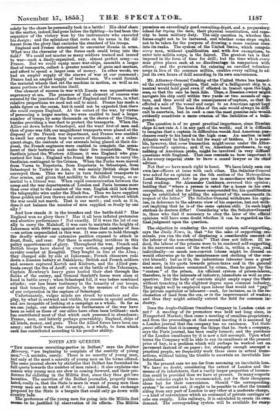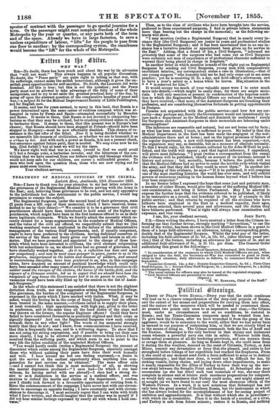NOTES AND QUERIES.
"Tun numerous recruiting-parties in Belfast," says the Belfast, Mercury, "are beginning to complain of the scarcity of young men."—A mistake, surely. There is no scarcity of young men, but only at the most a scarcity of young men on the terms offered. The same journal shows by statistics that Belfast has furnished its- full quota towards the number of men raised ; it also explains' one reason why young men are slow in coming forward, and their pre- ference for enlisting in the Militias first, since they thus get two bounties. The assertion of the Belfast journalist, properly trans. lateclrreally is, that the State is more in want of young men than, young men are in want of 64 or 81. ; and indeed, the exchange proposed by the State is a bargain that could only go down with Country lads. The preference orthe young men for going into the Militia first seems. to be justified, by observation of its effects The Militia. promisee an exceedingly good recruiting-depot; and. a, preparatory school for trying the men, their physical constitution, and capa- city to learn military duty. The only question is, whether the forces ought not to be increased, and whether some steps ought not to be taken for the purpose of drawing, a more various class. into its ranks. The system of the United States, which compels, every man, without qualification and, with. few exemptions, to,. enter into militia corps, is the fairest. The greatest tax is that imposed in the form of time for drill; but the time which even, man gives places. welt at no.: disadvantage in comparison with others ; and the permission for entering an enrolled volunteer corps in. lieu of the common militia, enables every calling.to ad- just its own hours of driltaeoording.,to ita own oonvenienoe, Attorney-General' Cashing of the United States has hazard- ed.the extraordinary opinion, that sale of a. belligerent' ship to . a neutral would hold good even if offeoted in transit upon the high seas, so that the sale be bind fide. Thus, a Russian owner might navigate his ship until within two yards or two seconds of cap- ture, and then avoid all the consequences of-capture, so that he effected a sale of the vessel and cargo to an American agent kept ready. on board. The bona fides of the sale would ,always be diffi- cult to ascertain, but in such a case the most genuine sale would evidently constitute a mere evasion of the liabilities of a belli- gerent; The question is of no great practical importance, since Russiszt ships do not:rate A.1 in any, part of the. world; and it- is difficult: to imagine that a captain in cliffioultbs.would find American.purr- chasereready. to his and on the high seas.• An auction in mid Atlantic: would be likely to fail for want' of bidders. It is possi- ble, however; that some transaction might occur under the Attor- ney-General's opinion; and if so, American. purohasers, to sasyy. nothing of American. pride, might be, involved in very dife t questions with- England. That ease reminds us how important it is for-every imperial state' to- have a sound lawyer as its. chief Raiser. Not that' we have mneh right to boast. We have lately seen our own.law-officers at issue with each other, The-Solicitor-General was asked for an opinion on • the-6th seetion of the Metropolitan Local Management Act:- ha gave one' in accordance with theina- turd reading. Sir Alexander Cockburn reversed this opinion; holding that' "-where.,: person is rated for a• house iw his-own occupation, and also for houses' compounded'fori his qimlifteatioir may be established by. adding the amountof ' the assessments in, respect of the latter." The Solicitor-General withdraws hia ion, in deference to the adverse view of his superior, but,not with- outimplying.that he is of the same opinion still. In• such higli. stations do dootors-differ-! Considering wile the Solioitork/eneral' it,: those who find it necessary to obey- the later of "the, WIWI:, opinions. will.have.some doubt whether.. it can be regarded'an finaLjudgment•upon.the question.
The-objection to rendering the, convict system self-supporting,, says the Daily- Newsi is, that "for the sake of supporting: girl, mmals, you run the risk- of. displacing a considerable amount• of the labour-of the-noir-criminals.' That does not follow: It in- deed; the labour of the prisons were to be.renderediself-supporting in the narrowest sense of 'the.word,—that. is,. within, a. year, n nil individually—so mach. non-oonviot, labour.- might- be, disused as would otherwise go to the maintenance- and clothing of the con- vict. himself ; but as it is, the industrious labourer loses a great` deal more, in his quota tower& prison-taxes and in the general' waste and.. hiuderance occasioned.- by crime, than he gains by. the: "custom" of the prison. An efficient. system of prison-labour, therefore, is' in the interests, of. industry, immediate as well as pro, speetive; But thee body of- convicts. might amply repay the State withouttrenohing in- the slightest-degree upon common industry. They might well be employed upon labour that would not "pay:" the private capitalist or.labourer--snoli, for-instance, as in the re- olamation of land from the sea, or in the. improvement of wastes ; and thus they might actually- extend the- field for common in- dustry.
Does the Anglo-Gfallicaur Omnibus Company in London exist. or not A meeting- of its' promoters was held not • long since, rungerford Market; then came a meeting otomnibus-proprietors; and from the proceedings at that second meeting it is assumed by, &London journal that-the company has no existence. Yet Gets-- gaugni affirms that itisiamong the things that be. Such a company, says-the Paris journal, has been really. formed ; and the .purchase of the London omnibuses by it is now a fait accompli. Upon what terms the Company will be able to run its omnibuses at the-present. price of hay, is a problem. which will perhaps be worked out on. pavement instead of- on paper; for, strangely enough amongst' a practical people, we frequently work these sums in • actual trans-- actions, without taking the trouble to ascertain an inevitable loss beforehand.
In the present ease- we are far from assuming an inevitable loss.. We have no doubt; considering the extent of London and. the• means of its inhabitants, that a 'vastly larger proportion °noisome.- tion could be provided than we have atsent. many-respects' public vehicles ought to be recommended not for their cheapness- alone but for their convenience. Should "the corresponding system" be carried out, it ought to bepossible to effect the transit. riding from any part of London to any other at a moderate charge, —a kind of convenience which no command. of private carriages'or cabs can supply. Like railways, it is calculated .to create its own.. The corresponding system will be available for mew.
demand. species of contract with the passenger to go special jonrnies for a term. Or the passenger might rent complete freedom of the whole Metropolis by the year or quarter, or any parts both of the term and of the space. Already we have in large factories, to save a useless expenditure of labour, " lifts " for the people to pass from one floor to another : by the corresponding system, the omnibuses would become the "lift" for the whole of the Metropolis.



































 Previous page
Previous page